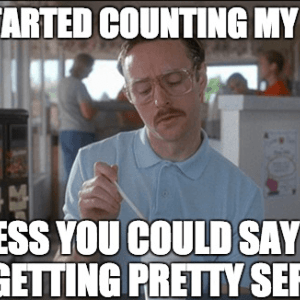THE UNINTENDED CONSEQUENCES OF COUNTING MACROS / CALORIES
I understand counting calories and your macronutrients can be a bit of a pain – especially in the beginning.
The daily tracking…
the label reading…
the measuring of your food…
it all can become a little tiresome.
However, it does have A LOT of benefits that most are unaware of and it can have a significant impact on your future success and the way that you see food.
To me, macro and calorie counting is a great method to start with for beginners who are looking to learn the basics of nutrition when it comes to body composition changes.
4 BENEFITS OF MACRO AND CALORIE COUNTING:
1) It opens your eyes up to just how much you are eating per day.
– Research continually shows that we are VERY BAD at estimating our calorie intake and expenditure. Most research shows that we can be off by nearly 50%. That turns your 2,000 calorie estimated diet into 3,000 actual calories (which can really kill any progress you think you should be making).
– Detailed tracking for just a few days can really make you understand how many calories you are consuming per day and if you know your maintenance calories (a good start being body weight x 14-15) you can understand why you are losing or gaining weight.
2) It makes you aware of what is exactly in the foods that you are eating
– Most of us are simply unaware of a number of calories that are in the foods that we are eating on a daily basis (I know I was before starting to count myself). When you start to count your macros, you familiarize yourself with nutritional labels in the foods that you like to eat. This can be a real eye opener – especially if you are used to consuming “junk” foods. Hell, even food that is labeled as “healthy” can be very calorie-dense.
– From there, you start naturally making lower-calorie foods fit in your diet. We all like getting the most “bang for our bucks.”
Example being a package of Pop-tarts that contains over 400 calories. You could swap that out for about 2 cups of white or brown rice for a similar calorie amount. .and you would likely feel much better and fuller overall.
3) It makes you aware of portion sizes
– Since you are going to be weighing out your food and tracking it’s calorie/macro profile.. you are going to have a basic understanding of portion sizes. Soon, you will get pretty good at eye-balling 1 cup or rice.. or 4 ounces of chicken.. and so forth. This can be a very useful tool when it comes to transitioning out of macronutrient/calorie counting and into a “mindful eating” phase.
4) Makes you understand that you can use the food that you LIKE to hit your goal
– No food is off limits when it comes to a macro dieting setup. When you understand that you can continue to make progress by not having to restrict yourself, it’s a real eye-opener and can allow you to have a much better relationship with food.
These are all unintended consequences of learning how to track your macros and calories for a certain amount of time. Obviously, the more you do it, the better that you will become with all of this mentioned above.
So, should macro/calorie counting be something that you need to incorporate into your entire life? Absolutely not – except in times when you need to be more precise (dieting, contest prep, etc).
The end goal would be to form habits and have the knowledge to move into a “mindful eating” phase – where you understand the basics of nutrition, understand portion sizes, and how much you need to fuel your body – where you understand your body and know when it is hungry and know when it is satiated and where you understand other emotional cues as well.
Thank you for reading and I hope that you enjoyed it!
